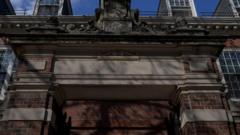A U.S. District Court judge has issued a temporary restraining order against a recent Trump administration decision that sought to revoke Harvard University’s ability to enroll foreign students. The order stems from a lawsuit filed by Harvard, claiming that the move was an unlawful intrusion on its rights and a blatant violation of free speech. The administration contends that Harvard has not sufficiently addressed issues of antisemitism and accused the university of maintaining inadequate hiring and admissions practices.
The ruling was handed down by Judge Allison Burroughs on Friday, halting the Department of Homeland Security's recent action to remove Harvard from the Student and Exchange Visitor Program (SEVP), crucial for managing foreign student visas. The next court hearing is scheduled for May 29 in Boston.
Harvard's legal challenge reaffirms the university's stance against what it describes as governmental overreach into its academic independence. “The government has sought to erase a quarter of Harvard's student body,” argued the university in its lawsuit, which consisted of over 6,800 international students, accounting for more than 27% of its total enrollment. Harvard President Alan Garber criticized the administration for its "unlawful and unwarranted action."
In response, the White House's deputy press secretary Abigail Jackson criticized the ruling, asserting the judge had a “liberal agenda” and implied that the administration was entitled to exercise control over immigration and national security.
The ruling has left many students at Harvard feeling uncertain, particularly those about to graduate and ponder their future in the U.S. Graduating senior Cormac Savage expressed concern about not being able to return to the U.S. if he left for his upcoming job in Brussels. Other students, like junior Rohan Battula, are faced with anxieties surrounding their visa status as graduation approaches.
International students are an important financial asset for Harvard, with many paying full tuition that helps subsidize costs for American undergraduates. The possibility of losing access to this demographic could lead to significant financial repercussions for the university.
Student sentiments are mixed, with some understanding the broader implications of the government's stance on free speech and campus culture. Leo Ackerman, a new student set to begin studies at Harvard, lamented how the administration's actions have cast a shadow over what should be an exciting opportunity.
As the legal battle continues, Harvard remains defiant against the Trump administration, engaging high-profile legal experts to contest the claims and defend its policies. The case may head to the Supreme Court, with the outcome uncertain but impactful for both the university and its international student body, many of whom now face an unsettling future.
The ruling was handed down by Judge Allison Burroughs on Friday, halting the Department of Homeland Security's recent action to remove Harvard from the Student and Exchange Visitor Program (SEVP), crucial for managing foreign student visas. The next court hearing is scheduled for May 29 in Boston.
Harvard's legal challenge reaffirms the university's stance against what it describes as governmental overreach into its academic independence. “The government has sought to erase a quarter of Harvard's student body,” argued the university in its lawsuit, which consisted of over 6,800 international students, accounting for more than 27% of its total enrollment. Harvard President Alan Garber criticized the administration for its "unlawful and unwarranted action."
In response, the White House's deputy press secretary Abigail Jackson criticized the ruling, asserting the judge had a “liberal agenda” and implied that the administration was entitled to exercise control over immigration and national security.
The ruling has left many students at Harvard feeling uncertain, particularly those about to graduate and ponder their future in the U.S. Graduating senior Cormac Savage expressed concern about not being able to return to the U.S. if he left for his upcoming job in Brussels. Other students, like junior Rohan Battula, are faced with anxieties surrounding their visa status as graduation approaches.
International students are an important financial asset for Harvard, with many paying full tuition that helps subsidize costs for American undergraduates. The possibility of losing access to this demographic could lead to significant financial repercussions for the university.
Student sentiments are mixed, with some understanding the broader implications of the government's stance on free speech and campus culture. Leo Ackerman, a new student set to begin studies at Harvard, lamented how the administration's actions have cast a shadow over what should be an exciting opportunity.
As the legal battle continues, Harvard remains defiant against the Trump administration, engaging high-profile legal experts to contest the claims and defend its policies. The case may head to the Supreme Court, with the outcome uncertain but impactful for both the university and its international student body, many of whom now face an unsettling future.




















